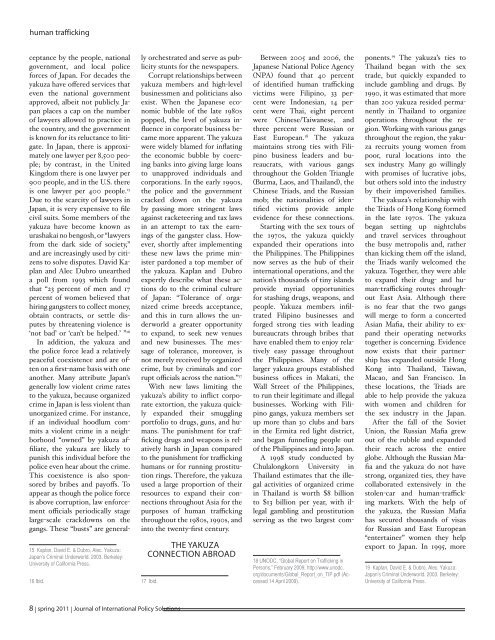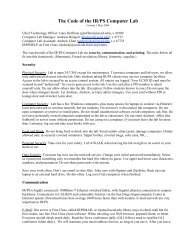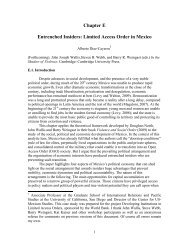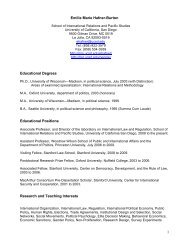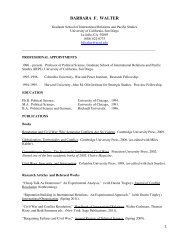to download the full journal. (1.2MB PDF) - School of International ...
to download the full journal. (1.2MB PDF) - School of International ...
to download the full journal. (1.2MB PDF) - School of International ...
You also want an ePaper? Increase the reach of your titles
YUMPU automatically turns print PDFs into web optimized ePapers that Google loves.
human trafficking<br />
ceptance by <strong>the</strong> people, national<br />
government, and local police<br />
forces <strong>of</strong> Japan. For decades <strong>the</strong><br />
yakuza have <strong>of</strong>fered services that<br />
even <strong>the</strong> national government<br />
approved, albeit not publicly. Japan<br />
places a cap on <strong>the</strong> number<br />
<strong>of</strong> lawyers allowed <strong>to</strong> practice in<br />
<strong>the</strong> country, and <strong>the</strong> government<br />
is known for its reluctance <strong>to</strong> litigate.<br />
In Japan, <strong>the</strong>re is approximately<br />
one lawyer per 8,500 people;<br />
by contrast, in <strong>the</strong> United<br />
Kingdom <strong>the</strong>re is one lawyer per<br />
900 people, and in <strong>the</strong> U.S. <strong>the</strong>re<br />
is one lawyer per 400 people. 15<br />
Due <strong>to</strong> <strong>the</strong> scarcity <strong>of</strong> lawyers in<br />
Japan, it is very expensive <strong>to</strong> file<br />
civil suits. Some members <strong>of</strong> <strong>the</strong><br />
yakuza have become known as<br />
urashakai no bengosh, or “lawyers<br />
from <strong>the</strong> dark side <strong>of</strong> society,”<br />
and are increasingly used by citizens<br />
<strong>to</strong> solve disputes. David Kaplan<br />
and Alec Dubro unear<strong>the</strong>d<br />
a poll from 1993 which found<br />
that “23 percent <strong>of</strong> men and 17<br />
percent <strong>of</strong> women believed that<br />
hiring gangsters <strong>to</strong> collect money,<br />
obtain contracts, or settle disputes<br />
by threatening violence is<br />
‘not bad’ or ‘can’t be helped.’ ” 16<br />
In addition, <strong>the</strong> yakuza and<br />
<strong>the</strong> police force lead a relatively<br />
peaceful coexistence and are <strong>of</strong>ten<br />
on a first-name basis with one<br />
ano<strong>the</strong>r. Many attribute Japan’s<br />
generally low violent crime rates<br />
<strong>to</strong> <strong>the</strong> yakuza, because organized<br />
crime in Japan is less violent than<br />
unorganized crime. For instance,<br />
if an individual hoodlum commits<br />
a violent crime in a neighborhood<br />
“owned” by yakuza affiliate,<br />
<strong>the</strong> yakuza are likely <strong>to</strong><br />
punish this individual before <strong>the</strong><br />
police even hear about <strong>the</strong> crime.<br />
This coexistence is also sponsored<br />
by bribes and pay<strong>of</strong>fs. To<br />
appear as though <strong>the</strong> police force<br />
is above corruption, law enforcement<br />
<strong>of</strong>ficials periodically stage<br />
large-scale crackdowns on <strong>the</strong><br />
gangs. These “busts” are general-<br />
15 Kaplan, David E. & Dubro, Alec. Yakuza:<br />
Japan’s Criminal Underworld. 2003. Berkeley:<br />
University <strong>of</strong> California Press.<br />
16 Ibid.<br />
ly orchestrated and serve as publicity<br />
stunts for <strong>the</strong> newspapers.<br />
Corrupt relationships between<br />
yakuza members and high-level<br />
businessmen and politicians also<br />
exist. When <strong>the</strong> Japanese economic<br />
bubble <strong>of</strong> <strong>the</strong> late 1980s<br />
popped, <strong>the</strong> level <strong>of</strong> yakuza influence<br />
in corporate business became<br />
more apparent. The yakuza<br />
were widely blamed for inflating<br />
<strong>the</strong> economic bubble by coercing<br />
banks in<strong>to</strong> giving large loans<br />
<strong>to</strong> unapproved individuals and<br />
corporations. In <strong>the</strong> early 1990s,<br />
<strong>the</strong> police and <strong>the</strong> government<br />
cracked down on <strong>the</strong> yakuza<br />
by passing more stringent laws<br />
against racketeering and tax laws<br />
in an attempt <strong>to</strong> tax <strong>the</strong> earnings<br />
<strong>of</strong> <strong>the</strong> gangster class. However,<br />
shortly after implementing<br />
<strong>the</strong>se new laws <strong>the</strong> prime minister<br />
pardoned a <strong>to</strong>p member <strong>of</strong><br />
<strong>the</strong> yakuza. Kaplan and Dubro<br />
expertly describe what <strong>the</strong>se actions<br />
do <strong>to</strong> <strong>the</strong> criminal culture<br />
<strong>of</strong> Japan: “Tolerance <strong>of</strong> organized<br />
crime breeds acceptance,<br />
and this in turn allows <strong>the</strong> underworld<br />
a greater opportunity<br />
<strong>to</strong> expand, <strong>to</strong> seek new venues<br />
and new businesses. The message<br />
<strong>of</strong> <strong>to</strong>lerance, moreover, is<br />
not merely received by organized<br />
crime, but by criminals and corrupt<br />
<strong>of</strong>ficials across <strong>the</strong> nation.” 17<br />
With new laws limiting <strong>the</strong><br />
yakuza’s ability <strong>to</strong> inflict corporate<br />
ex<strong>to</strong>rtion, <strong>the</strong> yakuza quickly<br />
expanded <strong>the</strong>ir smuggling<br />
portfolio <strong>to</strong> drugs, guns, and humans.<br />
The punishment for trafficking<br />
drugs and weapons is relatively<br />
harsh in Japan compared<br />
<strong>to</strong> <strong>the</strong> punishment for trafficking<br />
humans or for running prostitution<br />
rings. Therefore, <strong>the</strong> yakuza<br />
used a large proportion <strong>of</strong> <strong>the</strong>ir<br />
resources <strong>to</strong> expand <strong>the</strong>ir connections<br />
throughout Asia for <strong>the</strong><br />
purposes <strong>of</strong> human trafficking<br />
throughout <strong>the</strong> 1980s, 1990s, and<br />
in<strong>to</strong> <strong>the</strong> twenty-first century.<br />
THE YAKUZA<br />
CONNECTION ABROAD<br />
17 Ibid.<br />
Between 2005 and 2006, <strong>the</strong><br />
Japanese National Police Agency<br />
(NPA) found that 40 percent<br />
<strong>of</strong> identified human trafficking<br />
victims were Filipino, 33 percent<br />
were Indonesian, 14 percent<br />
were Thai, eight percent<br />
were Chinese/Taiwanese, and<br />
three percent were Russian or<br />
East European. 18 The yakuza<br />
maintains strong ties with Filipino<br />
business leaders and bureaucrats,<br />
with various gangs<br />
throughout <strong>the</strong> Golden Triangle<br />
(Burma, Laos, and Thailand), <strong>the</strong><br />
Chinese Triads, and <strong>the</strong> Russian<br />
mob; <strong>the</strong> nationalities <strong>of</strong> identified<br />
victims provide ample<br />
evidence for <strong>the</strong>se connections.<br />
Starting with <strong>the</strong> sex <strong>to</strong>urs <strong>of</strong><br />
<strong>the</strong> 1970s, <strong>the</strong> yakuza quickly<br />
expanded <strong>the</strong>ir operations in<strong>to</strong><br />
<strong>the</strong> Philippines. The Philippines<br />
now serves as <strong>the</strong> hub <strong>of</strong> <strong>the</strong>ir<br />
international operations, and <strong>the</strong><br />
nation’s thousands <strong>of</strong> tiny islands<br />
provide myriad opportunities<br />
for stashing drugs, weapons, and<br />
people. Yakuza members infiltrated<br />
Filipino businesses and<br />
forged strong ties with leading<br />
bureaucrats through bribes that<br />
have enabled <strong>the</strong>m <strong>to</strong> enjoy relatively<br />
easy passage throughout<br />
<strong>the</strong> Philippines. Many <strong>of</strong> <strong>the</strong><br />
larger yakuza groups established<br />
business <strong>of</strong>fices in Makati, <strong>the</strong><br />
Wall Street <strong>of</strong> <strong>the</strong> Philippines,<br />
<strong>to</strong> run <strong>the</strong>ir legitimate and illegal<br />
businesses. Working with Filipino<br />
gangs, yakuza members set<br />
up more than 30 clubs and bars<br />
in <strong>the</strong> Ermita red light district,<br />
and began funneling people out<br />
<strong>of</strong> <strong>the</strong> Philippines and in<strong>to</strong> Japan.<br />
A 1998 study conducted by<br />
Chulalongkorn University in<br />
Thailand estimates that <strong>the</strong> illegal<br />
activities <strong>of</strong> organized crime<br />
in Thailand is worth $8 billion<br />
<strong>to</strong> $13 billion per year, with illegal<br />
gambling and prostitution<br />
serving as <strong>the</strong> two largest com-<br />
18 UNODC, “Global Report on Trafficking in<br />
Persons,” February 2009, http://www.unodc.<br />
org/documents/Global_Report_on_TIP.pdf (Accessed<br />
14 April 2009).<br />
ponents. 19 The yakuza’s ties <strong>to</strong><br />
Thailand began with <strong>the</strong> sex<br />
trade, but quickly expanded <strong>to</strong><br />
include gambling and drugs. By<br />
1990, it was estimated that more<br />
than 200 yakuza resided permanently<br />
in Thailand <strong>to</strong> organize<br />
operations throughout <strong>the</strong> region.<br />
Working with various gangs<br />
throughout <strong>the</strong> region, <strong>the</strong> yakuza<br />
recruits young women from<br />
poor, rural locations in<strong>to</strong> <strong>the</strong><br />
sex industry. Many go willingly<br />
with promises <strong>of</strong> lucrative jobs,<br />
but o<strong>the</strong>rs sold in<strong>to</strong> <strong>the</strong> industry<br />
by <strong>the</strong>ir impoverished families.<br />
The yakuza’s relationship with<br />
<strong>the</strong> Triads <strong>of</strong> Hong Kong formed<br />
in <strong>the</strong> late 1970s. The yakuza<br />
began setting up nightclubs<br />
and travel services throughout<br />
<strong>the</strong> busy metropolis and, ra<strong>the</strong>r<br />
than kicking <strong>the</strong>m <strong>of</strong>f <strong>the</strong> island,<br />
<strong>the</strong> Triads warily welcomed <strong>the</strong><br />
yakuza. Toge<strong>the</strong>r, <strong>the</strong>y were able<br />
<strong>to</strong> expand <strong>the</strong>ir drug- and human-trafficking<br />
routes throughout<br />
East Asia. Although <strong>the</strong>re<br />
is no fear that <strong>the</strong> two gangs<br />
will merge <strong>to</strong> form a concerted<br />
Asian Mafia, <strong>the</strong>ir ability <strong>to</strong> expand<br />
<strong>the</strong>ir operating networks<br />
<strong>to</strong>ge<strong>the</strong>r is concerning. Evidence<br />
now exists that <strong>the</strong>ir partnership<br />
has expanded outside Hong<br />
Kong in<strong>to</strong> Thailand, Taiwan,<br />
Macao, and San Francisco. In<br />
<strong>the</strong>se locations, <strong>the</strong> Triads are<br />
able <strong>to</strong> help provide <strong>the</strong> yakuza<br />
with women and children for<br />
<strong>the</strong> sex industry in <strong>the</strong> Japan.<br />
After <strong>the</strong> fall <strong>of</strong> <strong>the</strong> Soviet<br />
Union, <strong>the</strong> Russian Mafia grew<br />
out <strong>of</strong> <strong>the</strong> rubble and expanded<br />
<strong>the</strong>ir reach across <strong>the</strong> entire<br />
globe. Although <strong>the</strong> Russian Mafia<br />
and <strong>the</strong> yakuza do not have<br />
strong, organized ties, <strong>the</strong>y have<br />
collaborated extensively in <strong>the</strong><br />
s<strong>to</strong>len-car and human-trafficking<br />
markets. With <strong>the</strong> help <strong>of</strong><br />
<strong>the</strong> yakuza, <strong>the</strong> Russian Mafia<br />
has secured thousands <strong>of</strong> visas<br />
for Russian and East European<br />
“entertainer” women <strong>the</strong>y help<br />
export <strong>to</strong> Japan. In 1995, more<br />
19 Kaplan, David E. & Dubro, Alec. Yakuza:<br />
Japan’s Criminal Underworld. 2003. Berkeley:<br />
University <strong>of</strong> California Press.<br />
8 | spring 2011 | Journal <strong>of</strong> <strong>International</strong> Policy Solutions


